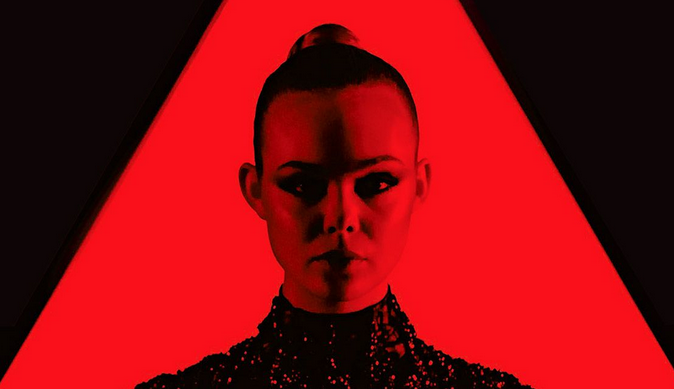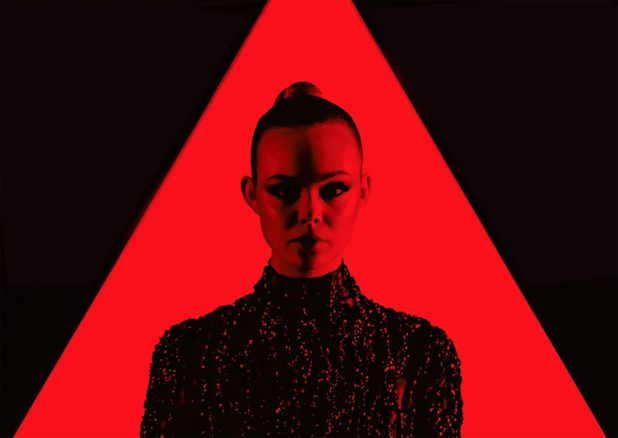J. Pound
The Right Stuff
December 29, 2016
Nicolas Winding Refn’s The Neon Demon offers a view of the Western world in uncertain times. Elle Fanning stars as Jesse, a small town girl looking to make it big as a model in the cutthroat industry. We learn that she has already worked with an amateur photographer, Dean (Karl Glusman), who is looking to make his own mark. He functions as a buoy for her, someone she can depend on while the thin vampire women try to eat her alive (literally and figuratively).
The film follows a strange arc. Jesse begins as a victim, a naïve 16-year-old girl surrounded by worldly, surgically enhanced veterans. She is thrust from the “idiocy of rural life” into the jaded and realpolitik world of L.A., where it is all about who to fuck, what plastic surgery to get, and what meals to skip to get to the next level, with little concern for one’s own well-being or that of others. She fakes her parent’s signature to get her start in the industry, and passes herself off as a 19-year-old. As she gains recognition, she achieves a strange balance between two roles: Jesse is at once a queen, a self-absorbed young women who cares for no one, yet she is also a little girl, a wide-eyed transplant from rural Georgia, who is helpless and powerless. She gains power as others show her recognition – as those girls who once chastised her are seen to be less than her. She is the one given the admiration and positions they all desire.
As the story moves forward, she becomes less sympathetic. Her arrogance and selfishness grow as she loses her status as a young victim. She oscillates between these two roles. At parts, she becomes the victim she played, the victim she genuinely was and pretended to be. In Plato’s Republic, he suggests in his discussion on actors that “If they imitate they should imitate, not any meanness or baseness, but the good only; for the mask which the actor wears is apt to become his face.”
It is important to keep her age in mind while making any criticisms of her character. Is she really to blame for anything? Can we provide any hard character judgments of this inexperienced, lonely girl? The closest thing she has to a caregiver or friend, aside from Dean, is Ruby (Jena Malone). As a fellow model and competitor for work and adulation, it is difficult to discern whether Ruby really cares for her. She does not seem entirely genuine, yet her deceptiveness is never definite. She is always somewhere in between; she feigns concern and shows concern at the same time. Is she warning Jesse of the predatory gatekeepers, the amoral fashion designers and photographers, to help her, or to bump off the new competition? After her Faustian pact, does she sell her country soul to gain the glory and power of an elite model – accepting Ruby as her Mephistopheles?
She, like most adolescents, wants to be the powerful and independent figure without the responsibility which comes with it. When she returns to her motel room to find a jaguar, her responsibility stares her in the face. She cannot deny that she is the young blood which is to be fed to the vultures of the industry. After leaving the sliding door open, the jaguar got in. While this is, in part, her own doing, she refuses to acknowledge her sense of agency. The sliding door is her wager, the Pandora’s box which she opens up with the hope of catching some diamonds in the pool of the saber teeth, glass shards, and knives.
Dean, though seeming more genuine in his concern, has his own issues. From his accent we can tell he also comes from a rural area. They connect with their earnestness and their feeling of being out of place. As the two spend the night looking at the stars, he finds out her true age; he goes to leave yet she pulls him back. He later goes in for a kiss when they arrive at her motel. Is this a fault of his, that he is content establishing a romantic relationship with this Lolita figure – can an exception be made for the two?
If this case is at least somewhat ambiguous, there is actual pedophilia insinuated in the film. Jesse stays alone in a cheap, dirty motel where the manager (Keanu Reeves) pimps out little girls. Is this an accident that this theme was introduced, as an aspect of the highs and lows of the underground West Coast world of glamour, corruption, success, and failure? There have been many documented incidents of pedophilia coming from the movie industry, with Corey Haim and Corey Feldman (“The Number one problem in Hollywood was and always will be pedophilia”) as alleged victims, the allegations made against Roman Polanski of drugging and sodomizing a 13-year-old girl, comments recently made by Elijah Wood (“Clearly something major was going on in Hollywood…it was all organized”).
There is no consensual sex in the film. Ruby does try forcefully to have sex with Jesse, despite her protests, though Jesse is able to break free. It is difficult after this moment to take Ruby as a genuine companion. Jesse does not have any ties with anyone in a serious manner. She is not in love with Dean, and she does not care when he leaves. She can take him or leave him. She will let him pay for her motel damages and stick up for her, but she never reciprocates she anything other than her beauty. It is difficult to find her as a sympathetic character; we can pity her, we can empathize with her, but she lacks the connections with others to really have the audience care about her and her situation. Her parents are “gone” but we do not know if they died or if they left her or she left them. Everything is temporary – her jobs, her motel room, her acquaintances, her styles. It is indicative of the frivolous culture, one with an eroded foundation and cheap innovations, with frills, bells, and whistles which clash with rather than complement one another, which is modern America. The women have anxiety over their “expiration dates” which come around age 20.
The richness of the sounds and colors with which Refn presents us contrast with the lack of emotional depth in the characters. There is clear pain in several of the women, and rampant envy and pride, but the interpersonal connections are otherwise superficial or nonexistent. He displays blood red, shapes and symbols which could either be ancient archetypes or modern cubist designs, the geometry of an acid-addled mind. The soundtrack, like his other films, is a mix of ambient and electronic pieces, futuristic, always helping to paint a picture with the images and storyline. Like Only God Forgives, we move through different frames of consciousness, in and out of dreams. It eschews the realism of Drive for a kind of hybrid atmosphere, a dark fun house of blood, estrogen, and dressing rooms which lead to the sunny and luxurious landscape curtain which covers the spiritual wasteland of the elite west coast.
This film shows the purgatory in which the modern Western woman finds herself. Somewhere between tradition and anti-tradition. This mirrors the dichotomy between the natural and the artificial. Jesse is the natural beauty who looks askance at her slightly older peers with pinned ears, shaved jaws, and a plethora of cosmetic surgery procedures under their belts. Fashion designer Roberto Sarno sees this natural beauty in her, and values her over her artificially enhanced competition. It is largely a world without men, without families, without children. Jesse has no familial ties and no significant other. As she becomes more habituated to her urban environment she rejects the love of Dean for the independence of her career. The blood throughout the film can be seen as a sign of either life or death. There is one scene with Jesse flat on the floor, a pool of blood below her vagina. Is this the death of her generative power? Does she choose the life of cold appearances over the warmth and depth of a more traditional life? The blood of life is something she supplies for the demands of the envious and predatory outsiders. Once rejected, a competitor of hers is found in the bathroom after smashing the mirror. Jesse is here compassionate for a brief moment, which results in the other girl trying to suck her blood. It is a world where the young are taken for everything they have. They are seen as a fountain of youth, and the cycle repeats as the once young become the predators of the new prideful young women.
Race figures in this movie in that, for the most part, everyone is white. There is one scene, before Jesse first meets Roberto Sarno, where all of the models are posing in a large, brightly lit room. There is one black women posing alone in the background with all of the white women a short distance away from her. Was this deliberate on Refn’s part? In a way it is indicative of the stark differences found in urban areas in the current world. There is generally a mix of the lumpenproletariat and the elites (and those which strive to be elites), accepting for a small portion of the middle class which has not yet migrated from the city or has recently migrated to the city). This small world of barren women, where whites are a majority, is closed off from outside, where non-white Hispanics are now the majority in California. Rather than producing at the rates of the other groups, these women of the current zeitgeist feed off the blood of others (in this case it is the young women, though it can also be men and the institutions and capital generated from them). They do not produce and they are unhappy, and they blame the men for their unhappiness. While the sexes display this antagonistic relationship with one another, this modern mindset of Western women is conspicuously lacking in non-white people.
We are left with a dark world of empty wombs, starved, frigid women whose “desirable” appearance is inversely related to their health and well-being. Young girls kill themselves to have the bodies of prepubescent boys. The women live fast, peak early, and then live in desperation, while the men are left confused at their own rejection and isolation. It is an intensely individualistic world for those in this microcosm, the world of lonely striving and vain pursuit at the expense of others in one’s own group (while in the outside world, other groups act collectively to wield power and take over demographically and culturally). Is this a snapshot Refn took for the time capsule of modern degeneracy and dissolution in the West? Is it just one strange erotic nightmare – or is it somewhere in between?

